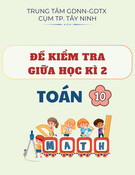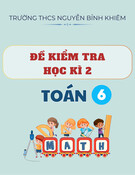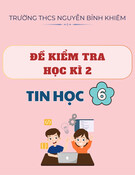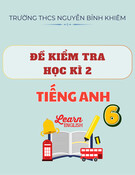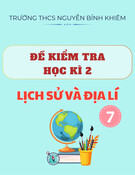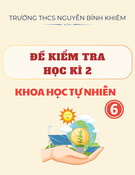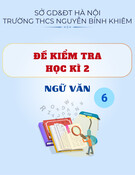
Page 1/ 4 – Type 261
Le Duan High School
Class: ___________
Student’s full name: ______________________
45 MINUTE- TEST (1)
ENGLISH 12
Date: October 5th 2011
-------------------------------------------------------------------------------------------------------------------------------
Part I: Pronunciation (1.25pts)
a. Choose the correct answer (A, B, C, or D) whose stress pattern is different from that of the rest in the
following question.
1. A. between B. instance C. signal D. student
b. Choose the correct answer (A, B, C, or D) whose underlined part is pronounced differently from that
of the rest in each of the following questions.
2. A. crowded B. rushed C. looked D. watched
3. A. attempted B. interested C. demanded D. reserved
4. A. responsibilities B. chores C. dishes D. solutions
5. A. believes B. speaks C. joins D. enjoys
Part II: Reading (1.25pts)
Read the following passage and choose the correct answer ( A, B, C, or D) from questions 6 to 10.
In the United States and Canada, it is very important to look at a person in the eyes when you are having
a conversation with him or her. If you look down or to the side when the other person is talking, that person
will think that you are not interested in what he or she is saying. This of course, is not polite. If you look
down or to the side when you are talking, you may appear hiding something, that is, it might seem that you
are not honest. However, people who are speaking will sometimes look away for a few seconds when they
are thinking or trying to find the right word. But they always turn immediately back to look the listener in
the eyes. These social rules are the same for two women, two men, a woman and a man, or an adult and a
child.
6. These social rules are used for ________________.
A. two men B. a man and a woman C. everybody D. two women
7. When you are talking to an American or Canadian, you should ________________.
A. look directly at him or her B. look to the side
C. avoid looking directly at him or her D. look down
8. “Looking down or to the side when someone is talking to you” means ________________.
A. you respect him or her B. you are afraid of him or her
C. you are paying attention to him or her D. you feel bored with his or her words
9. It is very ________________ of you not to look in the eyes of the listener while you are talking.
A. impolite B. polite C. honest D. dishonest
10. People can look away for a few words while speaking ________________.
A. to find something B. to find the correct word C. to hide something D. to hide their feelings
TPYE 261

Page 2/ 4 – Type 261
Part III: Speaking (1pt)
Choose the correct answer ( A, B, C, or D) from questions 11 to 14.
11. - James: In Vietnam, groceries are bought every day.
- John: ________________.
A. No, it’s wrong to say so B. Yes, it’s good
C. I don’t believe you D. I think so
12. - Nam: In America, children always sleep with their parents.
- Mai: ________________.
A. I don’t think you’re right B. I think not
C. Don’t think that D. Yes, I think it’s wrong
13. - Ben: Your writing is excellent!
- Paul: ________________.
A. Thank you very much but I don’t think so B. Thanks for your compliment
C. Please don’t say so next time D. I think you are talkative
14. - George: Congratulations! You won the game.
- Michael: ________________.
A. You’re welcome B. It’s my pleasure
C. It’s nice of you to say so D. That’s okay
Part IV: Vocabulary (2pts)
Use the given words in the box to complete the following sentences. There are more words than needed:
look after gifts obedient
share join hands between
non-verbal attention in
15. In my family, both my parents_______________ to give us a nice house and a happy home
16. He is always _______________ and hard working to please his parents.
17. Helen has to _______________ her younger brother when her parents are away from home.
18. There are differences and similarities _______________ Vietnamese and American cultures.
19. The groom’s family goes to the bride’s house bringing ______________ wrapped in red paper.
20. Most of the Asians think that it’s better and wiser for a couple to ______________ certain thoughts.
21. You shouldn’t whistle or clap your hand to get someone’s ______________.
22. At a restaurant, you can use some ______________ signals like raising your hand or nodding slightly to
show that you need assistance.
Part V: Grammar (3.5pts)
a. Put the verbs in the correct form in the following sentences: (1.5pts)
23. Lan (prepare) ______________ the breakfast before she went to work.
24. We (visit) ______________ our grandparents next week.

Page 3/ 4 – Type 261
25. (Mary, go) _____________________ out with you last night?
26. Yesterday, Smith was watering the flowers while I (plant) _______________ some trees in the garden.
27. Her son usually (get up) _______________ late on Sundays because he doesn’t go to school.
28. He (work) _______________ in this company since 2005.
b. Rewrite the following sentences without changing the meaning: (2pts)
29. Lan said to Bill, “Thanks for driving me to the airport.”
Lan thanked Bill ____________________________________________________________.
30. My father said to me, “Go to school on time.”
My father __ ________________________________________________________________.
31. Alice said to Tuan, “Where do you go for a picnic at weekends?”
Alice asked Tuan ____________________________________________________________.
32. Nam said, “I met some interesting people at the party last week.”
Nam _____________________________________________________________________.
Part VI: Writing (1pt)
Make meaningful sentences from the cues given below:
33. “Non la”/ protect/ people/ sun and rain.
_________________________________________________________________________.
34. In America/ old-aged parents/ live/ nursing homes/ but/ in Vietnam/ they/ live/ their children.
_________________________________________________________________________.
--------- THE END ---------

45 MINUTE TEST
Full name: …………………………………… Class: 12…
I. Choose the word which has underlined part pronounced differently.(1p)
1. A. specialize B. variety C. particular D. wide
2. A. resume’ B. salary C. school D. sun
3. A. explained B. disappointed C. prepared D. interviewed
4. A. applicant B. bride C. curriculum D. rim
II. Circle one underlined word or phrase that must be changed in order for the sentence to
be correct. (1p)
1. The woman which lives next door is a teacher of English
A B C D
2. Anyone where works is regarded as a useful member of our society.
A B C D
3. Unless you show your identity card, you will be able to enter the examination room.
A B C D
4. The academic year in England divided into three terms.
A B C D
III. Rearrange these words into meaningful sentences. (2p )
1. What/ subjects/ are/ required/ in/ entrance/ the examination?
………………………………………………………………………………………………….
2. you/ like/ the/ woman/ who/ lives/ next/ door/ Do?
………………………………………………………………………………………………
3. in/ four/ universities/ or/ Vietnam/ at/ almost/ five/ students/ stays/ years.
………………………………………………………………………………………………
4. Marry/ willing/ always/ person/ help/ is/ to/ a/ who/ others/ is people.
………………………………………………………………………………………………
IV. Choose the best answer to complete the following sentences.(2 p)
1. This dictionary …in 1879.
A. was published B. is published C. had been published D. publishe
d
2. During the interview, you should …. a real effort to answer all the questions.
A. take B. make C. give D. do
3. The entrance ….to universities in Vietnam always takes place in July.
A. way B. road C. examination D. path
4. I’d had met Tom if I …..to the party.
A. invited B. had invited C. had been invited D. was invited
5. I was learning Math when my mother …. .
A. comes back B. has come back C. had come back D. came back

6. You …..be on time or some minutes earlier for the interview.
A. can B. may C. should D. need
7. A: ……………………. – B: Certainly.
A. Welcome back B. What are you doing there?
C. I’m sorry I am late D. May I borrow a pen please?
8. A: Excuse me - B: ……………?
A. What B. Yes C. No D. Thank you
V. Read the following passage and answer the questions.( 2 p )
Parents send their children to school to prepare for the time when they grow up.
Children learn their native language so that they will be able to communicate fluently with other
people around them. Moreover, they can preserve the valuable culture and literature of their
country. They learn foreign languages in order to benefit from other country’s heritage. The more
foreign languages they learn, the more benefits they get. Children also learn math to calculate,
geography to know about nature, and history to know about human beings and historical events.
Nearly everything they study at school has some practical uses in their life.
1. How many school subjects are mentioned in the passage?
……………………………………………………………………………………………………..
2. According to the passage, children learn history to know about......
………………………………………………………………………………………………………
3. Why do children have to learn their native language?
………………………………………………………………………………………………………
4. Most of the things children learn at school ......
……………………………………………………………………………………………………..
VI. Finish sentences (2p)
1. She will pass the exam if ………………………………………………………………………
2. A farmer is a person who ……………………………………………………………………..
3. Unless you show your identity card, you …………………………………………………….
4. A writer is a person who ………………………………………………………………………

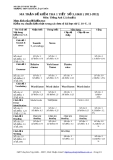
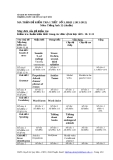
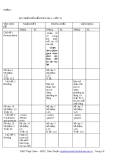
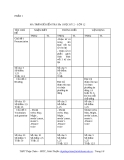
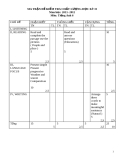
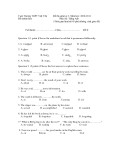
![Đề kiểm tra Tiếng Anh 1 tiết (Trắc nghiệm & Tự luận): Tổng hợp [mới nhất]](https://cdn.tailieu.vn/images/document/thumbnail/2011/20111009/chelsea2518/135x160/unit_2_cultural_diversity_4768.jpg)
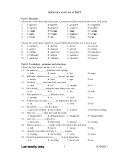
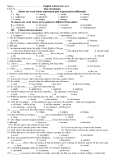
![Đề kiểm tra 1 tiết Tiếng Anh: Tổng hợp ngữ pháp [mới nhất]](https://cdn.tailieu.vn/images/document/thumbnail/2011/20110913/barcelona2518/135x160/kiem_tra_tong_hop_ngu_phap_tieng_anh_12hk2_4022.jpg)

![Đề thi Tiếng Anh có đáp án [kèm lời giải chi tiết]](https://cdn.tailieu.vn/images/document/thumbnail/2025/20250810/duykpmg/135x160/64731754886819.jpg)
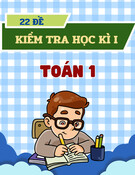
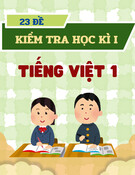

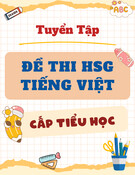
![Đề thi học kì 2 Vật lý lớp 11: Đề minh họa [Mới nhất]](https://cdn.tailieu.vn/images/document/thumbnail/2025/20250709/linhnhil/135x160/711752026408.jpg)
